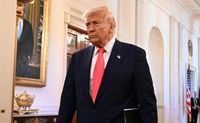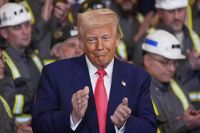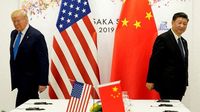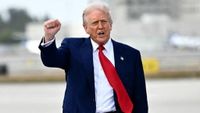As President Donald Trump navigates his second term, his approval ratings have taken a significant hit, particularly following the recent announcement of sweeping tariffs that have sparked widespread concern among American voters. The tariffs, introduced on April 2, 2025, as part of Trump’s "Liberation Day" plan, included a 10% baseline tariff on all imports and higher rates targeting countries deemed to be engaging in unfair trade practices. This move has not only rattled financial markets but also raised fears of a potential recession.
Trump's approval ratings, which had seen a brief rise in the early days of his second term, are now reflecting a more pessimistic public sentiment. According to a HarrisX poll conducted between April 4 and April 7, 2025, Trump's overall approval rating dropped 5 points since the tariffs were announced, landing at 47% approval and 49% disapproval—a net approval of -2 points. This decline underscores growing voter dissatisfaction with his economic policies, especially as inflation-weary Americans feel the financial pinch from rising prices.
Polling data reveals that a majority of Americans are skeptical about the tariffs' effectiveness. A staggering 72% believe that the new charges will increase the cost of goods they regularly buy, and 71% predict that these duties will likely cause a short-term recession. Furthermore, 54% of voters now say the economy is on the wrong track, an increase from 48% just days before the tariff announcement. The perception of economic weakness is palpable, with 66% describing the economy as weak, up from 58% earlier this month.
Trump’s handling of inflation and economic issues has also come under scrutiny. On March 21, 2025, 50% of respondents approved of his economic management, but that figure has since dropped to 44%. Similarly, approval for his handling of inflation has fallen to 43%, down from 48%. Notably, 55% of voters disapprove of Trump's approach to inflation, including 19% of his own 2024 voters, resulting in a net approval of -19 on this issue.
In light of these developments, Trump announced a surprise 90-day pause on most reciprocal tariffs just hours after they took effect. While the 10% baseline tariff remains in place, duties on Chinese imports have been raised to an astonishing 125% following Beijing's retaliatory actions. This pause, which is set to last until July 8, 2025, has been interpreted by some as a retreat in response to market pressures. Senate Minority Leader Chuck Schumer remarked on social media, "TRUMP RETREATS ON TARIFFS BECAUSE OF TRUMP SLUMP."
Despite the backlash, Trump's tariff policies retain a degree of support within his party. A recent Navigator Research poll indicated that 58% of Republicans view the tariffs favorably, contrasting sharply with the mere 4% of Democrats who share that sentiment. The YouGov/Economist poll further confirmed Republican support for Trump's tariffs, showing a margin of +57 in favor.
Looking at the broader implications, Trump's declining approval ratings could have significant ramifications for the upcoming midterm elections in 2026. The economy is always a focal point for voters, and Democrats are poised to leverage any dissatisfaction stemming from rising prices due to the tariffs. As economic anxiety grows, 38% of voters now report that their financial situation is worsening, up from 31% at the beginning of the month.
Moreover, the tariffs have led to a sharp decline in Trump's net approval rating on trade, which has plummeted to -3, down from +13 shortly after he took office in January 2025. The public's skepticism regarding the tariffs is evident, with 55% believing the new policies will harm their financial well-being and only 16% thinking they will provide any help.
The economic outlook remains bleak, with major financial institutions like Goldman Sachs and J.P. Morgan raising their recession forecasts in light of declining consumer and business confidence. CNBC's Jim Cramer has even warned of a potential repeat of the 1987 "Black Monday" crash, while former Federal Reserve Governor Frederic Mishkin cautioned that the tariffs could induce a recession and possibly lead to stagflation.
Amid these challenges, Trump's administration continues to grapple with the fallout from his tariff policies. The latest polling data suggests that while he may retain support among his base, the broader electorate is increasingly wary of the economic consequences of his decisions. As the midterms approach, the impact of these tariffs on Trump's approval ratings will be critical in shaping the political landscape.
In summary, Trump's approval ratings have significantly declined amid his administration's tariff policies, raising concerns about the economy and voter sentiment as the nation heads toward critical elections. With rising prices and economic uncertainty at the forefront of voters' minds, the next steps in Trump's economic strategy will be closely monitored by both supporters and critics alike.





